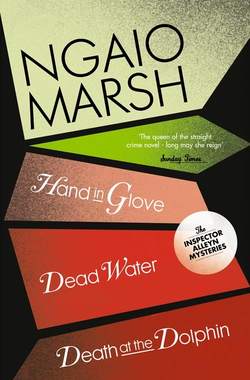Читать книгу Inspector Alleyn 3-Book Collection 8: Death at the Dolphin, Hand in Glove, Dead Water - Ngaio Marsh, Stella Duffy - Страница 11
III
ОглавлениеHe was a tall, elderly man with a marked stoop, silver hair, large brown eyes and a small mouth. He was beautifully dressed with exactly the correct suggestion of well-worn scrupulously tended tweed.
He advanced upon Nicola with curved arm held rather high and bent at the wrist. The Foreign Office, or at the very least, Commonwealth Relations, was invoked.
‘This is really kind of you,’ said Mr Pyke Period, ‘and awfully lucky for me.’
They shook hands.
‘Now, do tell me,’ Mr Period continued, ‘because I’m the most inquisitive old party and I’m dying to know – you are Basil’s daughter, aren’t you?’
Nicola, astounded, said that she was.
‘Basil Maitland-Mayne?’ he gently insisted.
‘Yes, but I don’t make much of a to-do about the “Maitland”,’ said Nicola.
‘Now, that’s naughty of you. A splendid old family. These things matter.’
‘It’s such a mouthful.’
‘Never mind! So you’re dear old Basil’s gel! I was sure of it. Such fun for me because, do you know, your grandfather was one of my very dear friends. A bit my senior, but he was one of those soldiers of the old school who never let you feel the gap in ages.’
Nicola, who remembered her grandfather as an arrogant, declamatory old egoist, managed to make a suitable rejoinder. Mr Period looked at her with his head on one side.
‘Now,’ he said gaily, ‘I’m going to confess. Shall we sit down? Do you know, when I called on those perfectly splendid people to ask about typewriting and they gave me some names from their books, I positively leapt at yours. And do you know why?’
Nicola had her suspicions and they made her feel uncomfortable. But there was something about Mr Period – what was it? – something vulnerable and foolish, that aroused her compassion. She knew she was meant to smile and shake her head and she did both.
Mr Period said, sitting youthfully on the arm of a leather chair: ‘It was because I felt that we would be working together on – dear me, too difficult! – on a common ground. Talking the same language.’ He waited for a moment and then said cosily: ‘And you now know all about me. I’m the most dreadful old anachronism – a Period Piece, in fact.’
As Nicola responded to this joke she couldn’t help wondering how often Mr Period had made it.
He laughed delightedly with her. ‘So, speaking as one snob to another,’ he ended, ‘I couldn’t be more enchanted that you are you. Well, never mind! One’s meant not to say such things in these egalitarian days.’
He had a conspiratorial way of biting his under-lip and lifting his shoulders: it was indescribably arch. ‘But we mustn’t be naughty,’ said Mr Pyke Period.
Nicola said: ‘They didn’t really explain at the agency exactly what my job is to be.’
‘Ah! Because they didn’t exactly know. I was coming to that.’
It took him some time to come to it, though, because he would dodge about among innumerable parentheses. Finally, however, it emerged that he was writing a book. He had been approached by the head of a publishing firm.
‘Wonderful,’ Nicola said, ‘actually to be asked by a publisher to write.’
He laughed. ‘My dear child, I promise you it would never have come from me. Indeed, I thought he must be pulling my leg. But not at all. So in the end I madly consented and – and there we are, you know.’
‘Your memoirs, perhaps?’ Nicola ventured.
‘No. No, although I must say – but no – You’ll never guess!’
She felt that she never would and waited.
‘It’s – how can I explain? Don’t laugh! It’s just that in these extraordinary times there are all sorts of people popping up in places where one would least expect to find them: clever, successful people, we must admit, but not, as we old fogies used to say – “not quite-quite”. And there they find themselves, in a milieu, where they really are, poor darlings, at a grievous loss.’
And there it was: Mr Pyke Period had been commissioned to write a book on etiquette. Nicola suspected that his publisher had displayed a remarkably shrewd judgement. The only book on etiquette she had ever read, a Victorian work unearthed in an attic by her brother, had been a favourite source for ribald quotation. ‘“It is a mark of ill-breeding in a lady,”’ Nicola’s brother would remind her, ‘“to look over her shoulder, still more behind her, when walking abroad.”’
‘“There should be no diminution of courteous observance,”’ she would counter, ‘“in the family circle. A brother will always rise when his sister enters the drawing-room and open the door to her when she shows her intention of quitting it.”’
‘“While on the sister’s part some slight acknowledgement of his action will be made: a smile or a quiet ‘thank you’ will indicate her awareness of the little attention.”’
Almost as if he had read her thoughts, Mr Period was saying: ‘Of course, one knows all about these delicious Victorian offerings – quite wonderful. And there have been contemporaries: poor Felicité Sankie-Bond, after their crash, don’t you know. And one mustn’t overlap with dear Nancy. Very diffy. In the meantime –’
In the meantime, it at last transpired, Nicola was to make a type-written draft of his notes and assemble them under their appropriate headings. These were: ‘The Ball-dance’, Trifles that Matter’, ‘The Small Dinner’, ‘The Partie Carrée’, ‘Addressing Our Letters & Betters’, ‘Awkwiddities’, ‘The Debutante – lunching and launching’, ‘Tips on Tipping’.
And bulkily, in a separate compartment, ‘The Compleat Letter-Writer’.
She was soon to learn that letter-writing was a great matter with Mr Pyke Period.
He was, in fact, famous for his letters of condolence.
